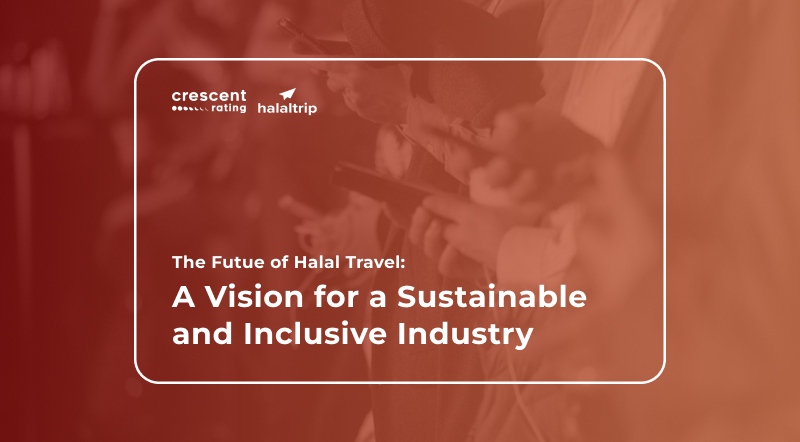
As global demand for more inclusive travel experiences continues to expand, halal tourism is emerging as one of the most promising sectors within the industry. The Halal in Travel Global Summit (HITGS) 2024 provided insights into the growing opportunities and trends shaping the halal tourism market. Muslim travelers play an increasingly significant role in the global travel landscape, and businesses across the travel, hospitality, and tourism sectors are evolving to meet this demand. However, understanding this market's specific needs and challenges is essential for businesses looking to capitalize on this growing segment.
What was once considered a niche offering has now grown into a dynamic and influential sector of the global tourism industry. According to data presented at HITGS 2024, Muslim travelers currently account for around 12% of international arrivals, representing a substantial portion of the global travel market. This growth is primarily fueled by a younger Muslim population with higher disposable income and a desire to explore the world without compromising their religious beliefs.
The evolution of halal tourism is marked by a shift from simply providing halal food to creating comprehensive Muslim-friendly travel experiences. Today, many hotels, resorts, airlines, and tour operators are adapting to meet the spiritual needs of Muslim travelers. For example, Muslim-friendly activities such as prayer rooms, alcohol-free zones, and gender-segregated and family-friendly services have become key differentiators for businesses aiming to attract this demographic. As halal tourism continues to evolve, successful companies must ensure their offerings are aligned with these values, creating a comfortable and welcoming environment for Muslim travelers while promoting inclusivity.
One of the primary challenges halal tourism faced in its early stages was a lack of awareness and understanding among suppliers and travelers. However, with better education and outreach, the industry has begun to overcome these barriers, leading to more sophisticated and well-rounded offerings. The role of education in the continued growth of halal tourism cannot be overstated, as both businesses and travelers benefit from a clearer understanding of what constitutes a truly Muslim-friendly experience.
HITGS 2024 highlighted the importance of training and equipping travel providers with the knowledge to cater effectively to Muslim travelers. Educational programs and industry certifications are becoming more widely available, enabling hospitality staff, tour guides, and travel agents to provide services that align with Islamic values.
For businesses, attaining halal certification and accreditation from trusted authorities can build trust and credibility among Muslim travelers. In addition to food certifications, hotels and resorts are increasingly seeking recognition for offering Muslim-friendly amenities, such as private prayer areas and halal kitchens. Certifications help standardize offerings across the industry and ensure that travelers can confidently book accommodations that meet their religious needs.
The modern Muslim traveler seeks more than compliance with halal standards. There is a growing appetite for tailored, authentic experiences that cater to individual preferences. Customer customization is becoming a key trend within the halal travel market, with increasing demand for niche offerings such as women-only travel packages, wellness retreats, adventure tours, and luxury travel.
Technology plays an important role in enabling this transformation. AI-driven solutions, such as halal filters in online booking platforms, simplify the travel planning process for Muslim travelers, helping them identify destinations and accommodations that suit their needs. PersPersonalizedommendations based on past preferences, dynamic travel packages, and digital platforms that allow for seamless trip planning are also becoming essential tools for meeting the expectations of modern travelers. Additionally, online reviews, social media, and influencer marketing play an increasingly influential role in shaping perceptions of Muslim-friendly destinations, allowing businesses to showcase unique experiences that may appeal to this audience.
As halal travel expands, it presents a unique opportunity for entrepreneurs and small businesses to carve out a niche within the market. Non-traditional travel options, such as halal-friendly adventure tours, cultural experiences, and culinary workshops, are gaining traction among younger Muslim travelers seeking authentic and enriching experiences.
Panelists at HITGS 2024 stressed the importance of innovation in capturing the attention of this growing demographic. Entrepreneurs who offer unique services, whether through curated experiences or tech-enabled solutions, can stand out in an increasingly competitive landscape. Evel small-scale but meaningful services, such as offering halal menus or providing modest swimwear at resorts, can make a significant difference in overall customer experiences.
Sustainability is no longer an option; it has become necessary for long-term success in the travel industry. HITGS 2024 emphasized embedding sustainable and ethical practices into the halal travel industry. Muslim travelers are increasingly concerned with eco-friendly practices and ethical tourism, seeking destinations and businesses that prioritize environmental conservation, local communities, and cultural heritage.
Incorporating sustainability into their business models is essential for businesses looking to thrive in the halal travel market. By promoting eco-conscious travel options, minimizing waste, and supporting local economies, businesses can appeal to conscientious travelers and contribute to preserving the destinations they serve.
Inclusivity lies at the heart of the halal travel movement. The goal is not only to cater to Muslim travelers but also to create environments where all travelers feel welcomed and respected. By fostering inclusivity, businesses can appeal to a broader customer base, including multi-generational families, women travelers, and those with specific cultural or religious needs.
The future of halal travel is marked by significant growth potential, driven by evolving consumer demands, technological advancements, and a heightened focus on sustainability and inclusivity. Businesses that recognize and respond to the needs of Muslim travelers by offering tailored, culturally sensitive experiences will be well-positioned to capitalize on this market.
By embracing innovation, prioritizing education, and fostering collaboration, the halal tourism industry can create a sustainable and inclusive travel landscape that welcomes all. As this market grows, businesses must go beyond adaptation and take the lead, positioning themselves at the forefront of a fast-evolving and highly promising segment of the global travel industry.
To explore more insights from industry experts, check out the discussions from the Halal in Travel Global Summit (HITGS) 2024 here!